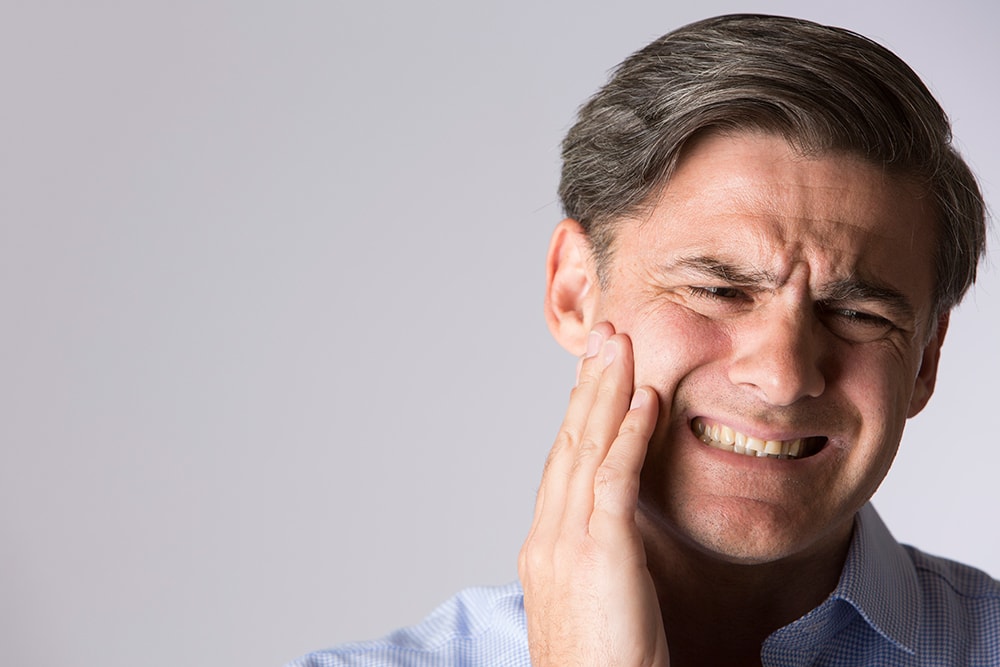The jaw is a complex anatomical structure, but think of its many parts as a hinge for your mouth. The lower jawbone (mandible) is attached to your skull (temporal bone) by a unique pair of joints called the temporomandibular joints (TMJs). These joints have a ball-and-socket arrangement with a shock-absorbing disk in between, allowing both a hinging and sliding motion. As with any joint, movements are controlled by muscles and nerves.
Sitting within your jawbones are your teeth and the gums that protect them. We use our jaws for eating, talking, and many other daily functions, so it’s no surprise that stress, disease, or injury can create problems. These problems often start with jaw pain.
Understanding the Causes of Jaw Pain
Pain is your body’s way of alerting you something is wrong — a signal you shouldn’t ignore if it’s persistent or acute. If you’re experiencing jaw pain, it’s a good idea to see your dentist. They will examine you, sometimes with the aid of X-rays, to determine the cause of your pain and the best way to relieve it. Jaw pain can be traced to many causes, and the most common ones include:
Temporomandibular Disorders (TMD)
Temporomandibular Disorders (TMD) refer to a group of conditions that cause chronic pain or dysfunction in the jaw joint area, also known as the temporomandibular joint (TMJ). With TMD, the source of pain can be the joint itself or the muscles surrounding it.
People with TMD often experience jaw pain while chewing, difficulty opening or closing their jaws, or a clicking sound during jaw movement. Yet, the exact cause of TMD pain can be difficult to pinpoint. It may result from nighttime clenching or teeth-grinding habits, or from various other conditions that affect joints in general. These may include arthritis, disk problems, strained tendons and ligaments, and inflammation.
Dental Problems
Jaw pain doesn’t always originate in the joint. In some cases, it may be alerting you to a dental problem that requires immediate attention. One dental problem could be a gum abscess, which is a pus-filled sac that develops beneath the gum line. An abscess can result from untreated gum disease, or may be caused by a trapped food particle that has developed an infection around it.
Deep tooth decay can also be felt as jaw pain. It results from a bacterial infection that has eroded the tooth’s hard enamel covering and reached the sensitive inner pulp. Any infection serious enough to cause pain can result in tooth looseness or even loss if not cared for promptly. This condition is usually treated with a root canal procedure.
Sinusitis
If you’re suffering from a sinus infection, you could experience jaw pain. Humans have sinuses around the eye, cheekbone, and nose area. When sinuses become swollen and inflamed, this pain and pressure can easily make their way to the jaw. Sinusitis usually clears up on its own, but if it lasts more than a week, you may want to visit your healthcare provider.
Stress
Whether you’re feeling stressed at work or at home, it could manifest into physical pain — especially in the jaw region. One of the most common causes of stress-induced jaw pain is bruxism — i.e., teeth grinding. If you find yourself grinding your teeth or clenching your jaw when stressed, it may lead to jaw pain over time. One way to help alleviate this type of pain is to wear a mouthguard at night because many people don’t realize they continue to grind their teeth when they fall asleep. You can purchase a universal mouthguard at a store, but the custom-fitted ones you can get at the dentist are generally more comfortable to wear.
Traumatic Injury
A traumatic injury to the face can also cause various painful jaw problems, including bone fractures, joint dislocations, swelling, and muscle spasms. This is sometimes accompanied by loosened or displaced teeth or gum injury. If you suffer a fall, sports injury, or other type of accident involving the face or head, a trip to the ER is usually advised — not only to treat any oral or facial pain, but also to rule out a brain injury.
See how much you can save with a dental savings plan.
Use our calculator below >
Understanding Your Treatment Options
If the cause of your jaw pain is minor, your healthcare provider may suggest an at-home remedy to help you feel better. These may include:
- Ice packs — Apply an ice pack to your face to help numb jaw pain.
- Heat compresses — Heat can help circulate blood flow and relax your muscles.
- Diet change — Avoid foods that are difficult to bite or chew. Eat softer foods such as yogurt and smoothies.
- Nonprescription pain relief — Ibuprofen, acetaminophen, and other over-the-counter medication can help temporarily relieve jaw pain.
- Relaxation techniques — Several jaw relaxation techniques help relieve pain. YouTube can be an excellent resource for learning how to perform these exercises.
It is always important to speak to your dentist promptly if you experience pain. They can diagnose your condition and refer you to a specialist if necessary.
If the cost of a dental visit is a concern, contact us to ask any questions about how a dental savings plan can fit your current needs. These plans are an affordable alternative to dental insurance and could help plan members save 10-60% on most procedures.

 Login
Login